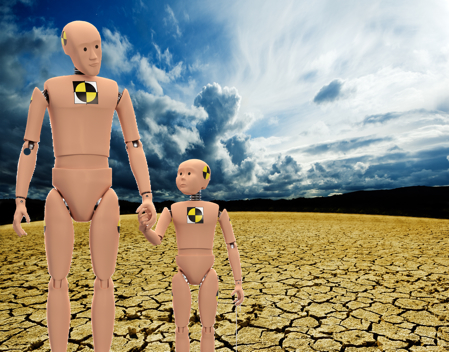
The recent release of the 5th Assessment Report from the Intergovernmental Panel on Climate Change (IPPC), and last month's shattering of the 400 parts per million carbon dioxide milestone in the northern hemisphere reminded me once again of the perilous times that we live in. The data reveal that the process of change in our climate system is happening even faster than predicted five years ago in the last IPCC assessment report: more rapid melting of ocean ice in the arctic, accelerating loss of the Greenland and West Antarctic ice sheets, faster melting of the permafrost and mountain glaciers, rising ocean levels, dying coral reefs, more extreme storms and floods, more severe droughts, and longer and more intense wildfires.
And we should keep in mind that, despite claims to the contrary, the scientific process is inherently conservative--it takes strong evidence for any results to be statistically significant and replication by others in order for any single study to stand up to scrutiny. At the end of the day, science is really about rejecting competing hypotheses that might explain a particular phenomenon--a sophisticated game of "Last Man Standing," so to speak.
In a strange way then, science is a competitive process. Biased or poorly designed studies do not make it through the peer review process. Only the strong survive. As a Ph.D. who has spent most of the past three decades in academia, I can attest to this! So, the claims made by some that the thousands of climate scientists from around the world involved in the IPCC process are either: 1. conspiring together; or 2. swayed by their left-left leaning political or ideological persuasions (a hypothesis yet to be tested), are simply preposterous: the scientific process itself mitigates against such tendencies. This realization makes the most recent IPCC report even more foreboding.
Yet with a few notable exceptions (e.g. the current initiative in the US to issue carbon dioxide regulations for coal-fired power plants under the Clean Air Act), the release of this report has generated barely a whisper among the political leaders, policy makers and corporate executives around the world in a position to take real action. The periodic issuance of these assessment reports from the IPCC has become the scientific equivalent of Chicken Little proclaiming that the "sky is falling." Few still outright deny that the climate is changing. Instead, the art of denial has now morphed into assertions that such changes are either: 1. Part of a natural cycle (i.e. not caused by human activity); 2. Not very significant; or 3. Potentially "beneficial" for humanity (see below for further explanation).
The first assertion simply does not hold up to scientific scrutiny. Suffice it to say that the evidence is overwhelming that human activity is driving the bulk of the greenhouse gas loading of the atmosphere that we are experiencing. Combustion of fossil fuels, emissions of methane from leaking natural gas pipes and wells, livestock, and melting permafrost, and deforestation (land clearing) for agriculture are clearly the culprits.
The second and third assertions simply reflect a lack of proper time perspective. The problem is akin to the proverbial crash test dummies that we have all witnessed on television: Seen in slow motion, as the car gradually crashes into the test wall, the dummies appear to be gently and peacefully moving forward into the steering wheel, airbags, and windshield as the front end of the car is gradually turned into an accordion. It all seems innocuous enough to make one think that perhaps such a crash isn't so bad after all--until you see it in real time. Viewed regular speed, the crash appears to be the abrupt and violent event that it really is--sudden, jolting, and catastrophic, for the car and the dummies!
Given our short tenure on this planet, we humans are a bit like the crash test dummies in slow motion: The changes that we see around us seem gradual enough that they do not seem particularly out of the ordinary--we've always had hurricanes, tornadoes, floods, droughts, and wildfires. So, maybe we are just in a bad stretch. Or even if this is the new normal, perhaps it won't be that bad: warmer temperatures means longer growing seasons...etc.
But when we view this video in "real time"--that is in geologic time--then the changes that are happening are occurring in the blink of an eye, like the actual crash of the dummies. As far as we can tell, the atmosphere and the climate of the earth have never changed this quickly before, in the history of the planet. Not even close. Sure, the climate has fluctuated wildly over the billions of years that life has thrived on our planet. But the changes took place over millennia, not decades. There was time for life to adapt. We, unfortunately, are driving ourselves into the proverbial wall, but we can only see it happening in slow motion. Time to clean out the head gear, humanity, or the next generation of dummies will not like how this crash video turns out.